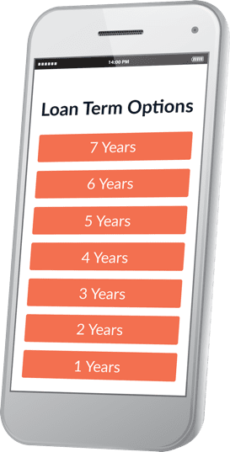LendingTree is compensated by companies on this site and this compensation may impact how and where offers appear on this site (such as the order). LendingTree does not include all lenders, savings products, or loan options available in the marketplace.
Refinancing replaces your current vehicle loan with a new auto loan, one with a different payment, interest rate or term.
Check your credit score
A lower-than-expected score might mean there are mistakes on your credit report. Double-check that everything is right and take care of any discrepancies before you apply for auto refinancing. You can view your credit score for free on LendingTree.
Apply online
Fill out one form on LendingTree and get up to five auto refinance offers from lenders based on your credit. Have your current auto loan information on hand, including your monthly payment amount, APR, loan term and payoff.
Compare offers
When lenders compete for your business, you can get the best deal. Compare the different rates, payments and terms you qualify for and see which one’s best for your budget. Don’t forget to use a car loan refinance calculator to help run the numbers.
Save money
Success! Enjoy your lower payment, lower APR or ability to pay the loan off faster. It feels great to meet your goals.

Refinancing your auto loan is worth doing if it can save you money. Every car payment you make at a higher interest rate than you deserve is a waste of money. Even if you stay at the same rate but refinance to a longer term, a lower monthly car payment could help alleviate budget pressure. But be aware that if you do lengthen your loan, you may end up paying a lot more in interest in the long run. Read about the common refinance mistakes that people make so you can avoid them.
Not at all, if it benefits you. The refinance company may try to sell you add-on products like guaranteed auto protection (GAP) insurance or an extended warranty, which can tack on thousands to your car loan. Don’t buy them if you don’t want them.
Applying for any type of auto loan means a credit inquiry. When a lender performs a hard credit pull, your credit score will most likely take a temporary dip. But it’s unlikely to be a severe drop and the impact should be short-lived.
Yes, it is possible to be approved for a refinance loan with bad credit but again, you want to make sure refinancing with a bad-credit refinance company is to your benefit. Like you would with any loan, make sure you apply to a few lenders, not just one, so that you know what you qualify for and get the best deal for you. It may even be possible to refinance after bankruptcy.
You might get a lower APR if:
If you haven’t been able to make on-time payments, refinancing may still be a way to lower your monthly bill. An alternative is to ask your current lender to modify your monthly payment.
A cash-out auto refinance is similar to a traditional auto refinance loan with one major twist: The new loan exceeds the total needed to pay off your existing car loan and you pocket the difference. This only works if your car is worth more than the remaining balance, or payoff amount we discussed earlier. It also means you’re taking on more debt and taking a chance that you could wind up underwater on your car loan.
It should cost you less than $100 and possibly nothing. Most auto loans do not have a prepayment penalty or an origination fee. The only thing that may cost is the fee to change the lienholder on the title, depending on your state’s rules, and some of your time. Given that refinancing could potentially save you a lot of money, it’s probably worth it.
Trading in your car and buying another (less expensive) one is an alternative to refinancing, but it’s not your only choice. You could sell your car or simply pay it off faster.